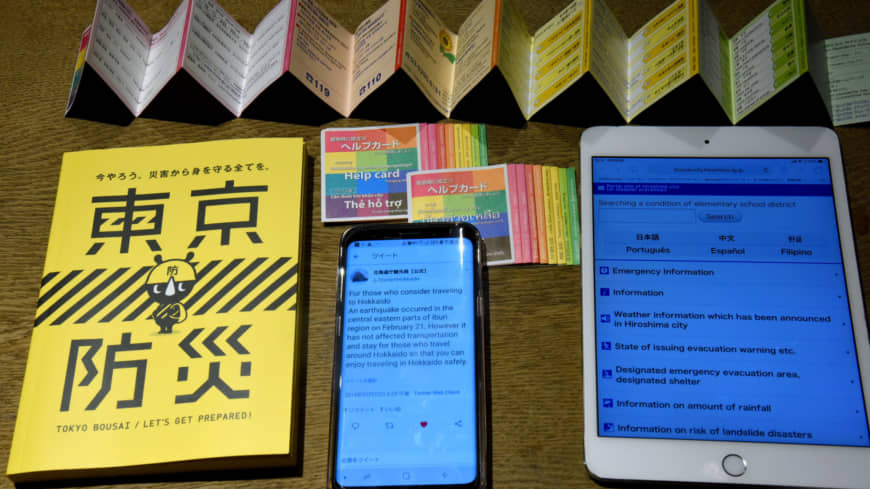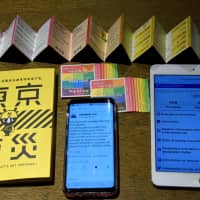The eighth anniversary of the Great East Japan Earthquake on March 11 is a good opportunity to learn disaster preparedness measures. Understanding how to obtain emergency information from reliable sources, such as local governments, is a good first step.
With foreign visitor numbers expected to grow ahead of the 2020 Olympics, municipalities are introducing multilingual emergency information services through websites, SNS and other tools, as well as providing leaflets on how visitors and Japan’s increasing number of foreign residents can respond to disasters.
When a magnitude 6.7 quake hit Hokkaido in September, many foreign tourists were frustrated as language barriers prevented them from obtaining crucial information. Tourists were stuck in Sapporo, other cities and airports because the quake caused blackouts and transportation disruptions.
As the powerful quake exposed how unprepared Hokkaido was in providing foreign visitors with information during a crisis, the Hokkaido Prefectural Government has been improving its information dissemination methods.
Yasunori Nishimura, an official from the government’s tourism bureau, acknowledged complaints that authorities were too slow in providing information in foreign languages after the quake.
“Following that feedback, we launched our official Twitter account in Japanese, English, Chinese and Korean on Feb. 1. It offers emergency information during disasters and tourism information at other times,” he said. The information covers the suspension and resumption of transportation services, as well as power outages and recovery.
The Hokkaido Prefectural Government will also open an emergency support center for foreigners when disasters strike in Sapporo. Officials and volunteers who speak English, Chinese and Korean will respond to visitors’ inquiries and post information on bulletin boards, Nishimura said.
As Japan is prone to earthquakes, local authorities are working to prepare for earthquakes and tsunami. But tourists and residents should also be aware of other disasters such as heavy rains.
In July, torrential rain wreaked havoc in western Japan, triggering floods and landslides that damaged homes and caused more than 230 deaths. Hiroshima, Okayama and Ehime were the hardest-hit prefectures and municipalities were hard-pressed to cope with emergencies. At that time, a public organization called the Hiroshima Peace Culture Foundation, in cooperation with the city of Hiroshima, provided information in English on its website. The foundation’s link was available on the city’s website.
The city also offers disaster information on its website called Portal Site of Hiroshima City for Disaster Prevention. Information, including evacuation warnings, is offered in Japanese, English, Chinese, Korean, Portuguese, Spanish and Tagalog.
Hirohisa Nogi, an official from the city’s crisis management office, said residents and visitors should first check the tab “A list of the state of issuing evacuation warnings etc.” at the top left of the page. Three kinds of warnings: preparation for evacuation, evacuation advisories and evacuation directives, are issued by local governments based on relevant laws.
“When an evacuation preparation warning is issued, the elderly and disabled should immediately evacuate to safer areas, while others should prepare for evacuation. If an evacuation advisory is issued, everyone should seek refuge due to a high possibility of an impending disaster,” Nogi said. People must evacuate immediately to any listed shelter when an evacuation directive is issued.
Nogi said people should check information about landslides and sediment disasters on the portal, noting it is difficult to judge landslide risks according to rainfall amounts.
“Even light rain can cause landslides if it continues for extended periods, as sediment disasters are triggered by increased water in the soil,” Nogi said.
Alerts about landslides and other disasters are also displayed in subtitles on TV and announced over community loudspeakers during emergencies, the official said.
While local governments are taking their own measures to convey multilingual disaster information, the Tokyo Metropolitan Government is offering an app called Disaster Preparedness Tokyo, which offers disaster information and alerts in Japanese, English, Chinese and Korean. Other smartphone apps for disasters are available, including one called Safety Tips launched by the Japan Tourism Agency.
The Tokyo Metropolitan Government’s Bureau of Citizens and Cultural Affairs has made a business card-sized leaflet, Help Card, that includes emergency phone numbers, such as a call center that introduces hospitals offering services in foreign languages, toll-free numbers for ambulances and a disaster emergency message service that operates when phone communications are disrupted. The Help Card can be used when earthquake-caused blackouts occur and people cannot charge smartphones.
The leaflet carries words and phrases used in emergencies in multiple languages so that users can point to a phrase and show the equivalent Japanese when seeking help. Nobuharu Hikiba, a director of the bureau, said five versions of the Help Card are available. Each shows information in Japanese and two or three foreign languages. The Help Card is printed in 12 languages overall.
“The information is minimal, but if you carry it with your commuting pass, it can help during emergencies,” Hikiba said.
The card is available at ward offices and there are plans to distribute it at metropolitan tourist information centers. People who want the card can also apply at the bureau’s website.
While the card provides brief information on how to protect yourself, residents are best advised to prepare for disasters in advance, for example, by stabilizing furniture and stockpiling water. Basic information is provided in the Tokyo Metropolitan Government’s Disaster Preparedness Tokyo app and also on the government’s website.
The Tokyo Metropolitan Government will open a counter for foreigners at its office in Shinjuku and also send volunteer interpreters to shelters when disasters occur, Hikiba said. The government has some 830 registered volunteer interpreters and translators ready to work during disasters.
With help from these volunteers and the information obtained from the above-mentioned tools, foreign residents and tourists can reliably “hope for the best and prepare for the worst.”

NHK provides key disaster info
NHK World-Japan, the international service of Japan’s public broadcaster NHK, offers a diverse range of information on Japan and other parts of Asia on TV, radio and the internet. To accommodate the increasing number of foreign residents and visitors, NHK World has expanded its programs and services — particularly during natural disasters.
On its English TV news channel, NHK World offers news on disasters, as well as images of breaking news broadcasts from domestic channels by adding simultaneous English interpretation when necessary.
When massive damage is expected during disasters, NHK World cancels its scheduled programming and broadcasts news about the disaster. For example, when a 6.7 magnitude earthquake hit Hokkaido in September, NHK covered damage to homes, other infrastructure and transportation, as well as live coverage of news conferences held by the Japan Meteorological Agency and the chief cabinet secretary.
NHK World’s website regularly provides online streaming of its television and radio programs, along with news articles in 17 languages and shorter articles in five languages on its Facebook page.
Last year, the multilingual broadcaster added a new feature to its app NHK World TV to deliver emergency warnings and breaking news alerts. Warnings and alerts are offered in English and Chinese for those who download the free app and enable push notifications.
In the event of a power outage, news on TV broadcasts and smartphone apps may be unavailable. During the Hokkaido earthquake, NHK World aired its news programs in English, Vietnamese, Thai and Russian through its domestic radio channel Radio 2, which usually broadcasts education programs in Japanese.
The multilingual programs and services are part of NHK World’s efforts to help visitors from overseas and foreign nationals living in Japan ahead of the 2020 Olympics and Paralympics in Tokyo by expanding access to such crucial information.




